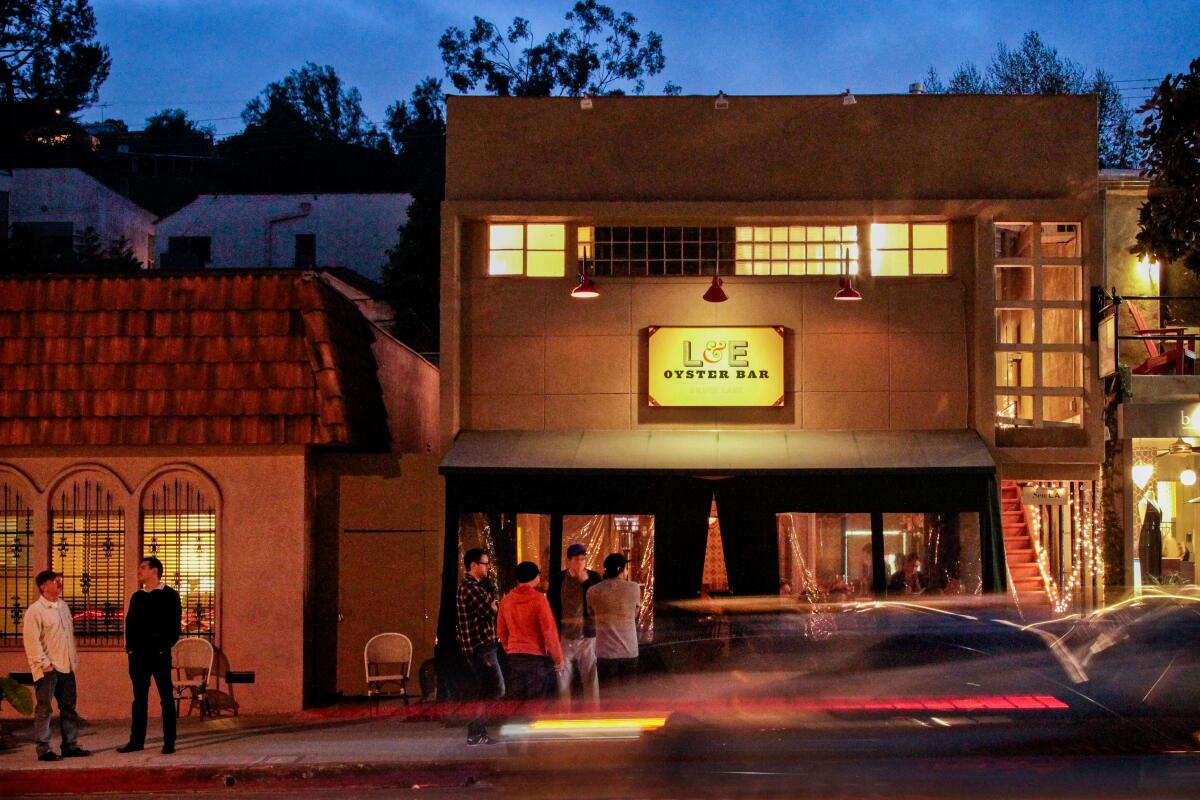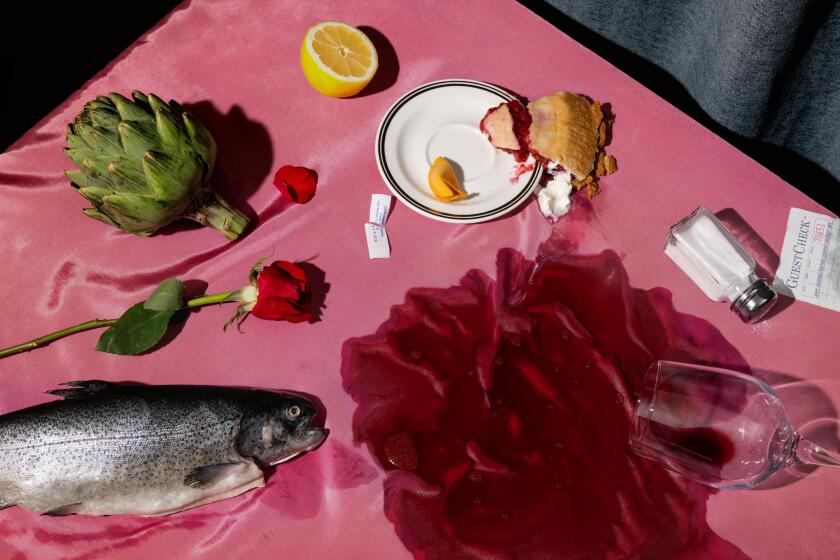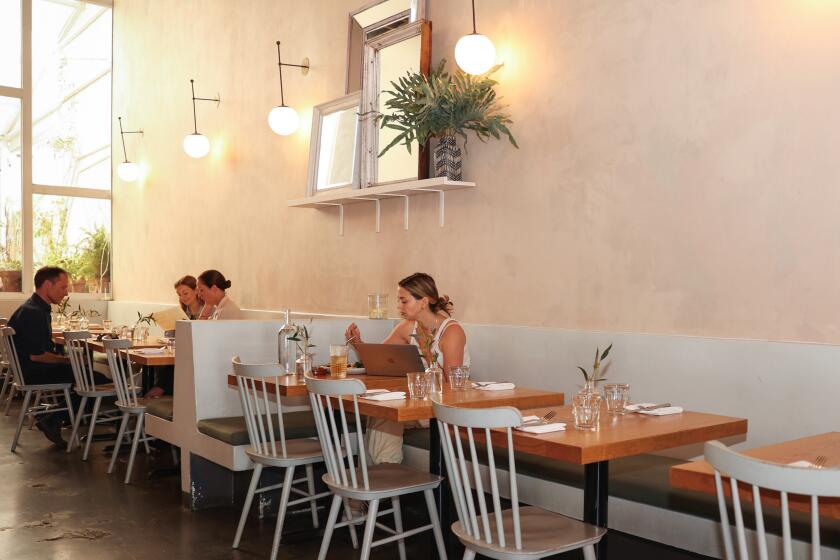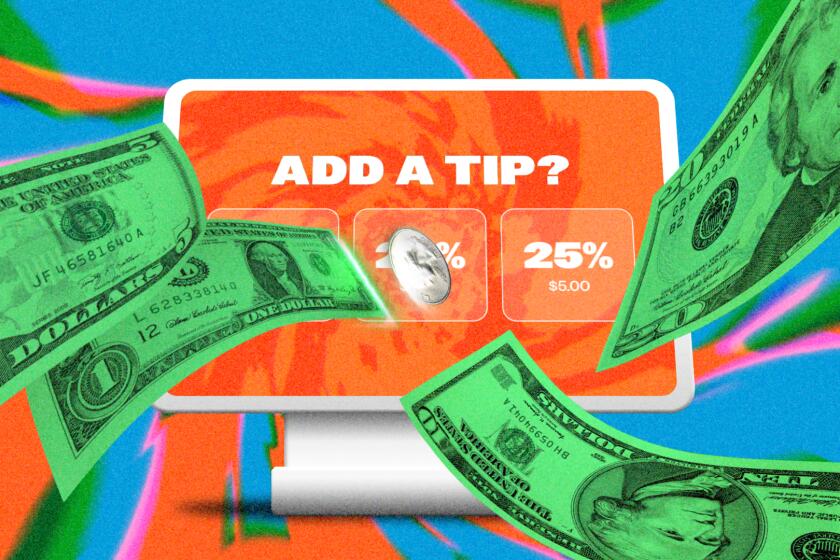Restaurant service fees are staying after all with Newsom signature of last-minute bill

- Share via
Those 3, 5 and 20% fees at the bottom of your menu could be here to stay.
With little time to spare, a new law will allow restaurants and bars to continue charging service fees, healthcare costs and other surcharges when listed clearly for diners to see. The practice was set to be outlawed beginning Monday.
On Saturday, Gov. Gavin Newsom signed Senate Bill 1524, an emergency measure to exempt California food and beverage vendors from Senate Bill 478 — a law that goes into effect in July and targets ticket sellers, hotel and travel websites and other businesses that charge “hidden” or “junk” fees.
Before Newsom signed SB 1524, which was introduced in early June, restaurants and bars were included in the affected businesses, and Atty. Gen. Rob Bonta had advised that the food and beverage vendors roll such fees into listed menu prices to avoid the possibility of legal action.
“These deceptive fees prevent us from knowing how much we will be charged at the outset,” the attorney general, who co-sponsored SB 478, said in a statement the day it was signed. Bonta could not be reached for comment regarding the exemptions allowed by SB 1524.
Numerous business operators in the service industry have been vocal against SB 478, which passed in October. They said they feared that raising list prices during a tumultuous year marked by closures and inflation would cost them more customers and support. Multiple restaurateurs told the Los Angeles Times that the process of revising or entirely overhauling their tipping and surcharge system could result in the loss of staff benefits or all-out closures. SB 1524’s rules allowing such surcharges could affect tens of thousands of restaurants throughout the state.
The industry is facing a crisis as new legislation, inflation, higher wages and pandemic fallout have chefs and owners worried for the future of mom-and-pop restaurants.
“We’re the most regulated of any business out there, and we are struggling to survive in the broken system that has been handed to us throughout many, many decades,” said Eddie Navarrette, a co-founder of the Independent Hospitality Coalition, a restaurant advocacy group. “When you add more regulations, whatever it may be, it makes things more difficult. Things are already difficult … there is a mass exodus of our small-restaurant community. I think it’s a huge relief, just to have one less thing being thrown at them right now.”
Navarrette spent weeks campaigning for SB 1524’s passage, writing letters, meeting with upwards of 35 policy advisors, legislators or their representatives, knocking on doors at the state Capitol, and explaining the usage of service fees within the restaurant industry, whose tip-based employee earnings make it different from most fields that will be affected by SB 478.
Surcharges, health fees and service charges are regularly used within the industry to stabilize wages across dining rooms and kitchens — where servers often receive tips but cooks and dishwashers do not — and to help offset the cost of benefits such as healthcare. Businesses with larger service fees, such as 18% or 20%, often note that tips are not expected.
“It’s confusing why the restaurants are claiming that they need to do things differently, because it just feels like they’re saying that they need to hide the cost of their food for us, and that doesn’t feel right,” said Jenn Engstrom, state director of the California affiliate of the Public Interest Research Group (CALPIRG) a nonprofit organization that advocates for consumer interests and protections.
“It feels like you’re being duped,” she said. “That’s what it feels like: that they’re trying to trick you.”
Reversing course, the author of a bill to ban junk fees has proposed emergency legislation to carve out an exemption for restaurants.
Some local restaurants have come under fire on accusations of misusing service fees or other surcharges, though multiple chefs and restaurateurs told The Times that these “bad actors” are few and far between.
“Every restaurateur that I know who cares in this industry is using it in a way that is so immensely appropriate and responsible and forward-thinking that if it was to go away, it would be really crippling to everybody,” Kato restaurateur Ryan Bailey told The Times earlier this year.
The new bill, which passed unanimously in the state Assembly and Senate in late June, was co-written by Sen. Bill Dodd (D-Napa) — who also co-wrote SB 478 — as well as Sen. Scott Wiener (D-San Francisco) and Assemblymembers Matt Haney (D-San Francisco), Jesse Gabriel (D-Encino) and Cecilia Aguiar-Curry (D-Winters).
It is supported by the California Restaurant Assn. and the labor union Unite Here, both of which represent thousands of hospitality workers in California.
SB 1524 “will enable restaurants to continue to support increased pay equity and to make contributions to worker health care and other employee benefits,” Matthew Sutton of the California Restaurant Assn. said in a statement. “And, importantly, consumers will remain empowered to make informed choices about where they choose to dine out.”
While some restaurateurs and bar operators are breathing a sigh of relief over the continuation of service fees, others are frustrated with the government’s quick change in tack.

Following the attorney general’s guidance for SB 478, in April restaurateur Dustin Lancaster rolled a 4% surcharge into the menu list prices of two of his L.A. restaurants, L&E Oyster Bar and El Condor. He said that SB 1524 would not prompt him to revert to a service-fee model, at least for the foreseeable future, and that it wasn’t “so simple to just unbake the cake.”
“This is, sadly, all too familiar territory for restaurants in California,” Lancaster told the L.A. Times this week. “Just like in COVID, they jerk us around and expect us to pivot and change our model repeatedly as if it’s no big deal to small businesses. Restaurants continue to shutter [at] an alarming rate in L.A., and this sort of unnecessary about-face is why California continues to be the least small-business-friendly state in America.”
At Bell’s, a Michelin-starred restaurant in Santa Barbara County’s Los Alamos, owners diligently tracked the progress of both state Senate bills and awaited final word before determining whether to remove their 20% service charge, which benefits all nonmanagerial staff.
And even before SB 1524’s passage, Bell’s listed the charge on its the lunch and dinner menus, on its web page for frequently asked questions, and on its homepage section on takeout orders. The new law will allow the restaurant to continue its practice without reconfiguring its business model.
Greg Ryan, an owner of Bell’s, told The Times that he had been listening to and was understanding of customers, legislators and his team, and that he wanted to do what was best for his staff.
For months, the practice has felt like a balancing act.
As SB 1524 made its way through California’s Assembly and Senate, outcry on social media and in public forums such as Reddit was swift and vocal, with multiple anonymous posters commenting that to retaliate for the exemption, they would stop leaving tips. Another Reddit user created a spreadsheet that tracks surcharges and service fees in restaurants across the state.
The norms around whom, and how much, Americans tip have shifted in recent years — and consumers are increasingly confused.
An L.A. restaurateur, speaking anonymously for fear of customer retribution, told The Times that they’d seen an increase in tips of $1, 0% or other low amounts over the course of the month, possibly in response to the 3-4% service fees their restaurant was charging.
“I’m not thrilled with the bill,” CALPIRG’s Engstrom said of SB 1524. “I think it was better when restaurants and bars also had to have really clear upfront pricing, so that consumers could do easy comparison shopping. When I decide to go out to a restaurant with my family, I check the prices first, on the menu, online.”
That SB 1524 requires clear posting of fees is a benefit, she said, but it’s not as strong as SB 478 with the attorney general’s initial guidance that called for rolling service fees into listed prices. Engstrom called SB 478 “a great model bill,” saying she would love to see similar consumer-protection legislation in other states, or federally — without many carve-outs for industries, regardless of how service fees factor into their business plans.
“I think [SB 1524] is unfortunately kind of a step backwards, but it’s still transparent,” she said. “You can still see it; you just have to do the math.”
More to Read
Eat your way across L.A.
Get our weekly Tasting Notes newsletter for reviews, news and more.
You may occasionally receive promotional content from the Los Angeles Times.














